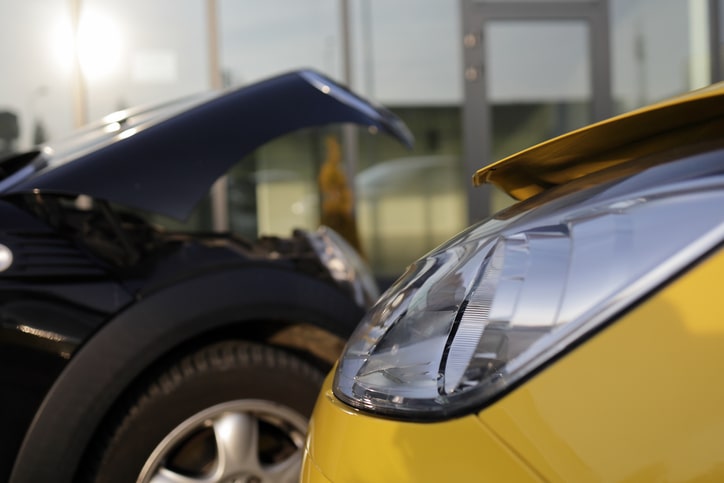February 14, 2024 | Car Accidents

There are a lot of ways to get around in Oklahoma. Of course, taxis have long been a popular form of transportation in Oklahoma City. There are several taxi services, including Yellow Cab Taxi and Airport Express. Over the last decade, ridesharing—led by Uber and Lyft—has changed the industry. Of course, accidents are a concern with all types of motor vehicle transportation.
Rideshare accident claims can be especially complicated. There are some unique rules, regulations, and considerations that arise in these types of cases. Within this article, our Oklahoma City Uber accident lawyer provides an overview of the key differences—and also some of the similarities—between taxi accidents and ridesharing accidents in Oklahoma.
Difference #1: Ridesharing Drivers Use Their Own Personal Vehicle
Taxis are licensed vehicles that are regulated. A traditional taxi service in Oklahoma City needs the proper permit from the Oklahoma City Police Department. Of course, ridesharing vehicles—those from transportation network companies (TNCs) such as Uber and Lyft—do not work in quite the same way. Ridesharing drivers use their own cars to drive passengers around. It is a big difference from taxi drivers—who typically drive vehicles that are owned or leased by the taxi company. It is a distinction that matters. The personal ownership of a ridesharing vehicle versus a taxi could potentially impact who is responsible for an accident. A car used for “Uber” is not always considered a ridesharing vehicle. When it does not have passengers, it may be a personal vehicle.
Difference #2: Insurance is Complex in Ridesharing Accident Claims
Most motor vehicle accident claims are handled by insurance companies. Insurance is always complicated, but especially so in rideshare accident claims. Dealing with insurance claims after an Uber accident or a Lyft accident can be much more complicated than with a traditional taxi service. Ridesharing companies like Uber and Lyft provide insurance for their drivers—but this insurance only kicks in under certain conditions. For example, if the rideshare app is on and the driver is waiting for a ride request, the insurance coverage is different than when a passenger is actually in the car. Taxi services, on the other hand, have a more straightforward insurance policy that covers their fleet of vehicles and drivers at all times. The insurance policies for rideshare accidents tend to be higher than a traditional taxi accident.
Difference #3: Uber and Lyft are Massive Companies
Another key difference between ridesharing accidents and taxi cab accidents is that the big ridesharing companies that operate in Oklahoma (Uber and Lyft) are massive multinational corporations. They have considerable resources. Of course, this can make it intimidating for passengers, pedestrians, and other injured to pursue claims against them. Working with a skilled rideshare accident lawyer can help lessen the intimidation. In contrast, most taxi services are smaller and may be more localized. This size difference can influence how accidents are handled. Still, taxi accident claims are certainly not easy.
Similarity #1: Fault Always Matters
Oklahoma is an at-fault motor vehicle accident state that operated under a modified comparative fault standard (Okla. Stat. Ann. Tit. 23 § 13). In both taxi and rideshare accidents, figuring out who is at fault is absolutely crucial. Whether the driver was speeding. distracted, driving recklessly, unlawfully intoxicated, that matters. The party who is deemed at fault for causing a crash—whether it is a taxi cab crash, an Uber crash, or any other type of accident—can be held liable for the resulting damages. Every accident in Oklahoma should be thoroughly investigated.
Similarity #2: Victims Have Right to Seek Compensation
In both taxi accident claims and ridesharing accident claims, injured victims in Oklahoma have the right to seek financial compensation for the full extent of their economic losses and their non-economic damages. Both taxi passengers and rideshare users can file claims against the driver’s insurance or the company’s insurance or pursue legal action. You may be entitled to recover compensation for property damage, medical bills, lost wages, loss of future earning power, pain and suffering, long-term disability, physical impairment, and wrongful death of a family member.
Contact Our Oklahoma City Rideshare Accident Attorney for a Free Case Review
At McGuire Law Firm, our Oklahoma City Uber & Lyft accident lawyer has got your back when you need legal help the most. If you or your loved one was hurt in a ridesharing crash or a taxi cab crash, we are here to help. Give us a call now or contact us online for a free, no-obligation case review. With law offices in Oklahoma City and Edmond, we take on both taxi accident claims and ridesharing accident claims throughout all of Oklahoma.